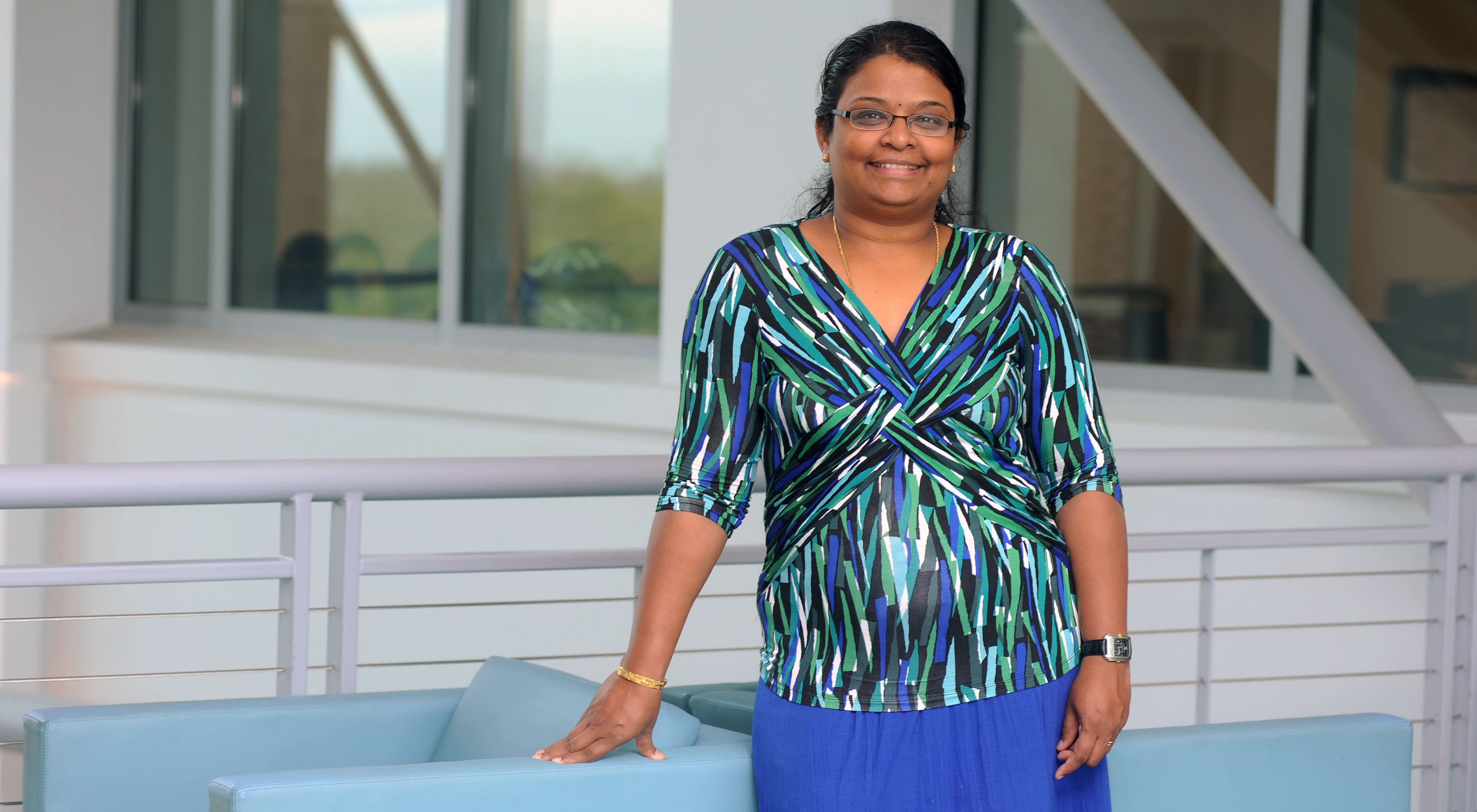UWF Professor Searches For Efficient Power Generation
Pensacola – In Bhuvaneswari Ramachandran’s hometown in India, power went out for a week as rain pelted the region. But it was monsoon season, when blackouts are a regular occurrence.

Power generators dislike spikes, high or low, says the University of West Florida assistant professor in electrical and computer engineering. Ramachandran has dedicated her career to helping power companies maintain the consistent and efficient power transmission that they crave.
An expert in energy auction strategies and power system modeling, Ramachandran – “Dr. Ram,” as her students call her – is conducting research with her students on how electric vehicles and other power sources affect power supply. UWF boasts about 60 students in its sustainable energy program.
Ramachandran and her students, using the University as their power grid, discovered that the University of West Florida’s nearly 100 electric vehicle fleet could not only consume energy from the power grid, but also provide it.
Society today relies on electricity like never before. Just look at what happens when there is no power in the wake of a hurricane. Everything from gas pumps to our most portable devices rely on being able to tap into that power. And consistent, reliable power that goes into and out of the grid and is available upon request is the hallmark of a modern culture. Smooth distribution with a minimum of spikes helps ensure that.
“We need smarter energy systems in distribution as well as generation,” Ramachandran said.
“We need renewable energy sources added into the grid.”
Given the variable power generation, especially with sustainable energy sources, such as solar, wind and bio fuels, Ramachandran said production and demand can be calculated. But generation of power by renewable sources can be unpredictable, making forecasts complicated for power companies. She and her team are looking for solutions.
Dr. Mohamed Khabou, chair of the UWF Department of Electrical and Computer Engineering, said Ramachandran’s research is important to power producers.
“Energy companies hate fluctuation,” he said. “They want their energy supply to be steady.”
Ramachandran, who said she was surprised to learn how much energy UWF uses, said part of her research is to make power production more consistent and reliable.
“We are trying to improve results to arrive to the best solution,” she said.
Ramachandran said charging electrical cars can be used to help provide a consistent level of power delivery by draining the batteries. So, energy can flow from the power grid to the vehicles or from the vehicles to the grid.
“We can steal energy from the battery to feed the grid,” Ramachandran said. “That energy can give a boost to the system when needed and smooth out fluctuations.
”In the power industry, this is known as peak sharing.
This goes hand-in-hand with Ramachandran’s main research, which is smart grid energy markets. Every day, power companies trade energy to meet their projected demand for the next day. So trading happens every 15 minutes of every day in advance or 24 hours beforehand.
Ramachandran said her ultimate goal is to maximize energy seller’s profit, while continuing power supply reliability.
“How much demand is expected tomorrow?” Ramachandran asked. “Auctions take place in every energy market.
”Ramachandran said this can be further complicated by the weather. She points out that the recent rains in India left both rich and poor in the dark for days. However, nine months out of the year in her region it’s sunshine most of the time, supporting many solar plants.
“We need smart grids in India, too,” she said. “It’s densely populated and definitely needs smart grids.
”The University works closely with Gulf Power, and part of this includes taking advantage of solar. Gulf Power is in the process of introducing its Gulf Solar Energy Share program that allows residents to support the development of solar power, while getting a credit of up to $2.50 on their monthly electric bills.
However, Khabou said solar isn’t the most reliable source of energy. Besides cloudy weather,batteries have yet to efficiently convert and store all the solar power.
“Even though this is the Sunshine State, we have a lot of clouds,” he said. “California is the best state. It has better sun and better solar output.
”While a viable source, solar power still has cost and efficiency issues. In fact, Ramachandran pointed out that typically 60-70 percent of power transmission is kept, meaning 30-40 percent is lost.
“I don’t think it will ever go up to 100 percent, but maybe 75 percent,” she said.
Meanwhile, Ramachandran will continue her research at the UWF on coming up with every possible advantage, electric car batteries and otherwise, to help minimize the energy peaks and valleys that disgust power generators.
Written by Duwayne Escobedo



